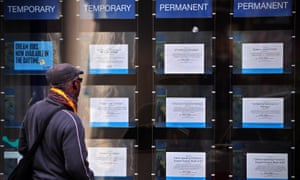 The Guardian
The Guardian
Falling number of EU workers in Britain compounds businesses’ recruitment woes

Pay growth for British workers has unexpectedly increased at the strongest rate for three years amid the lowest levels of unemployment since the mid-1970s.
The Office for National Statistics said average weekly earnings excluding bonuses in the three months to the end of July increased by 2.9% compared with a year ago, up from 2.7% in the quarter to the end of June. Total pay including bonuses picked up from 2.4% in June to 2.6% in the three months to July.
The gradual increase for workers’ pay will provide welcome relief for UK households struggling with higher levels of inflation since the EU referendum, when the sudden drop in the pound pushed up the cost of imports to Britain. Regular pay growth was last higher than 2.9% in July 2015.
The latest snapshot from the jobs market could suggest workers’ bargaining power is gradually rising on the back of the lowest levels of unemployment for four decades, with the jobless rate of 4% the lowest since the winter of 1974-75. Fewer people for companies to hire can help drive up demands for better pay and working conditions.
However, economists warned the growth in pay remained below the levels seen before the collapse of Lehman Brothers a decade ago. They also suggested there could be trouble ahead for British workers because of Brexituncertainty.
Samuel Tombs, chief UK economist at Pantheon Macroeconomics, said that while the strongest pay growth was among people moving jobs, workers may be increasingly opting to stay put while the risk lingered of no deal with the EU. “It would be a mistake to extrapolate the recent pickup in wage growth [into a trend],” he said.
Businesses across the country are also becoming increasingly concerned about the mounting difficulty of hiring workers, compounded by falling number of EU workers in the UK jobs market as Brexit approaches.
The latest figures from the ONS showed a record for the number of job vacancies in Britain, reaching 833,000 unfilled positions in the three months to July, the highest level since comparable records began in 2001.
The latest pay figures suggest average earnings are finally starting to pull away from inflation, helping to improve household spending power across the country. The ONS said real pay growth – taking account of inflation – edged up to 0.5% excluding bonuses, and 0.2% including them.
The latest reading is likely to be welcomed by the Bank of England after Threadneedle Street raised interest rates above the level set since the financial crisis, taking them to 0.75% last month from 0.5%.
The central bank had forecast growth in pay, although a number of economists disagree, warning that the precarious nature of the jobs market and high usage of zero-hours contracts has eroded the bargaining power of workers. Sign up to the daily Business Today email or follow Guardian Business on Twitter at @BusinessDesk
John McDonnell, the shadow chancellor, used a speech to the TUC conference in Manchester on Tuesday to pledge greater powers for workers in the gig economy, as well as an increase in the minimum wage to £10 an hour from £7.83 at present.
Esther McVey, secretary of state for work and pensions, said: “Since 2010 we have delivered significant growth in jobs, and in the last six months we’ve seen real terms wage growth.”
Average weekly wages are still lower than the 2008 levels achieved before the financial crisis, remaining £31 below the pre-crisis average. The annual rate of growth in pay is still lower than the averages seen in the run-up to the financial crisis, when wages often rose by about 5%.
The Resolution Foundation said real wage growth has not hit 1% since 2016, and 3% since 2003, emphasising the size and scale of what it called Britain’s long-running disaster on pay.
Stephen Clarke, senior economic analyst at the Resolution Foundation, said: “While Britain continues to enjoy near record employment levels, the key benefit of historically low unemployment – stronger pay growth for those already in work – is only slowly materialising.”
https://www.theguardian.com/money/2018/sep/11/unexpected-rise-uk-pay-growth-jobless-total-40-year-low



